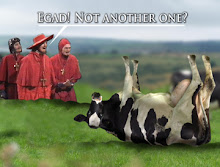This is a comment from a post that I called L'chaim -- to Life! I thought it was worth bringing to the forefront. Welcome Robin.
Hi David, You might be right in that Paul had a deeper message in "wait for one another". That would be in keeping with the spirit of what he said.
I think the real issue is what was happening with this fellowship meal.
In the first century, the Lord's Supper was a full meal.
In his book "Paul's Idea Of Community", Robert Banks points out that "The most visible and profound way in which the community gives physical expression to it's fellowship is the common meal."
The NT word for "supper" literally means a dinner, a meal. or a banquet. And the Greek word for "table" indicates a table in which a full, square meal is spread.
To continue with Robert Banks, "The word 'deipnon' (1 Cor 11:20), meaning 'dinner,' tells us that it was not a token meal (as it has become since) or part of a meal (as it is sometimes envisaged), but an entire ordinary meal. This meal is vital, for as the members of the community eat and drink together their unity comes to visible expression. The meal is therefore a truly social event...the meal that they shared together reminded the members of their relationship with Christ and one another and deepened those relationships in the same way that participation in an ordinary meal cements and symbolizes the bond between a family or group"
G.H Lang argues along the same lines in his book "The Churches Of God"
"This was known as the 'Agape' or feast of love, and though it had led to abuses at Corinth the apostle does not repudiate the practice, but regulates it's observance...It is healthful that this picture rises before the mind. An ordinary house the place; a customary meal the occasion; the Supper quietly and easily conjoined therewith. No ecclesiastical building, no priest or functionary, no altar or sacrifice, no vestments or ornaments, as lights, incense, crucifixes. no formality. The supper observed in simplicity; the home dignified thereby, the ordinary meal sanctified and solemnized"
In "The Untold Story Of The New Testament Church", Frank Viola sheds some light on the why of Paul's writing in this regard, the abuses that were taking place at the time.
"The slaves work late and cannot make the church meetings on time. The well-to-do are not waiting for them, but are eating the Lord's Supper ahead of their poor brethren. Still worse, the well-to-do are treating the Lord's Supper as if it were a private dinner party. They are gorging themselves on the food and getting drunk on the wine"
As well, the cultural customs of the day were penetrating the practices of the fellowship.
"Corinth was a Roman colony so Roman customs were observed. The common banquet etiquette of the first century was to separate those who ate by social class. The wealthy merchants were fed with one kind of food in the dining room....the left overs and less superior foods were given to the poor and slaves in the courtyard."
When we read Paul's letter in correct historical context, I think it's pretty obvious that he was speaking against and correcting the abuses that were taking place. When the self-indulgent higher class did not "wait for one another" in spirit and in practice, many of the poorer brethren suffered the natural consequences of this abuse. They quite literally were "weak and sick and dying"
"The Lord's supper is not a morbid reminder of Christ's sufferings. Nor is it an occasion where we mourn over our sins. No! The Supper is a cheerful reminder of who Jesus Christ is. The Lord's Supper, therefore, is a celebration. It is a happy conversational meal. It is a banquet of joy marked by sharing and thanksgiving." (Frank Viola, "Rethinking the Wineskin".)
Monday, March 3, 2008
Subscribe to:
Post Comments (Atom)


No comments:
Post a Comment